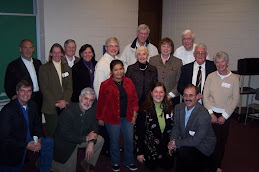 In an America magazine article “On Their Way Out”, William Byron, S.J picks up on a suggestion that their should be a exit-interview for Catholics leaving the Church behind. The rationale is that Church leaders should be concerned enough to learn why large numbers of “Cradle Catholics” no longer find a spiritual home in the Catholic Church. The irony is that bishops don’t care what people think. They think they are the sole founts on truth, and anyone who doesn’t think so can just “go to Hell.” You can find the article at http://www.americamagazine.org/content/article.cfm?article_id=12642
In an America magazine article “On Their Way Out”, William Byron, S.J picks up on a suggestion that their should be a exit-interview for Catholics leaving the Church behind. The rationale is that Church leaders should be concerned enough to learn why large numbers of “Cradle Catholics” no longer find a spiritual home in the Catholic Church. The irony is that bishops don’t care what people think. They think they are the sole founts on truth, and anyone who doesn’t think so can just “go to Hell.” You can find the article at http://www.americamagazine.org/content/article.cfm?article_id=12642I found the following reader’s response well written and worth sharing…
I am a 51 year old "Cradle Catholic," one of 5 kids raised in a family that went to church every Sunday with parents who made sure we received our sacraments growing up. I am the only one that still attends Mass regularly. I've been active in my church, in music ministry and teaching CCD. And yet I'm on the cusp of leaving as well, for a variety of reasons.
I find Church teaching on gays and women to be immoral, and do not want my son taught that a loving God considers only unmarried, straight men worthy of invoking His presence at Mass. I find the Church response to the pedophile scandal immoral as well - first moving, rather than removing priests, and later insisting that it is all a media-driven conspiracy to undermine Church authority.
In particular I find the politicization of the Church totally unacceptable. I never thought I would see the American bishops oppose providing health care for all - the most shameful homily I've ever heard a Catholic priest give came in the fall of 2009, when he incited parishioners to contact legislators urging them to vote "no" on health care. In opposing health care reform, the bishops have, in my view, forfeited their moral leadership.
Year after year I've listened to the local bishop and priests tell Catholics that abortion is the most important moral issue facing the country and that it must be the primary factor in deciding how to cast our votes in elections. Yet in the 13 years I attended Mass at the local Cathedral, there was not a single special collection devoted to crisis pregnancy centers - not a diaper or jar of baby food was collected. This supposed "priority" also merited no mention in the yearly pleas for contributions to the bishop's Lenten appeal. Moreover, when our bishop decided to undertake a special fundraising effort, it was not to support crisis pregnancy services, but to build himself a fancy mansion to live in next to the Cathedral. What was that moral priority again? These bishops will throw women out of the church for saving a mother's life (Bishop Olmstead), threaten to withhold communion from pro-choice politicians, and make a show of praying the rosary outside of abortion clinics, they will not lift a finger to help women and babies in need, even urging legislators to deny them access to health care. The hypocrisy is nauseating.
The growing emphasis on the Church as institution, rather than the Church as a teacher of Christ, is also a problem. I find that the Church is more closed and inward looking, teaching a faith that can exist only within the church walls, rather than in the wider world - Christ's message was to "go and make disciples of all nations," not, "build walls between yourself and the world."
I also find the growing emphasis on grandeur and finery among the Church hierarchy - ermine cloaks, crowns, lace vestments - a complete contradiction of the Christ who dressed in the simplicity of a Galilean peasant and who was only dressed in fine robes and a "crown" by his tormentors to mock him.

And, given all of the legitimate issues facing the Church in the world, Rome decides that monkeying with the English translation of the Mass is the most important thing it has to do. Is God any less present in the Mass as it is now? Will this new translation improve the "pipeline" to the Divine? Then why bother, if not simply to assert Roman authority? Latin was used in the early centuries of the Church not because it had any special divine significance, but because it was the spoken language of the believers in Rome (assuming they translated the scriptures correctly from the Greek and Hebrew to begin with). This insistence on strict translation of the Latin suggests that the Mass is little more than a magical incantation (see Harry Potter) - say it "correctly," and poof, Jesus appears; say it "incorrectly," and He withholds His presence.
My family and I do still attend Mass regularly, for now, but only because there is a nearby Jesuit parish that emphasizes the Gospel teachings of Christ, rather than the institutional Church. We will see what the future brings.





